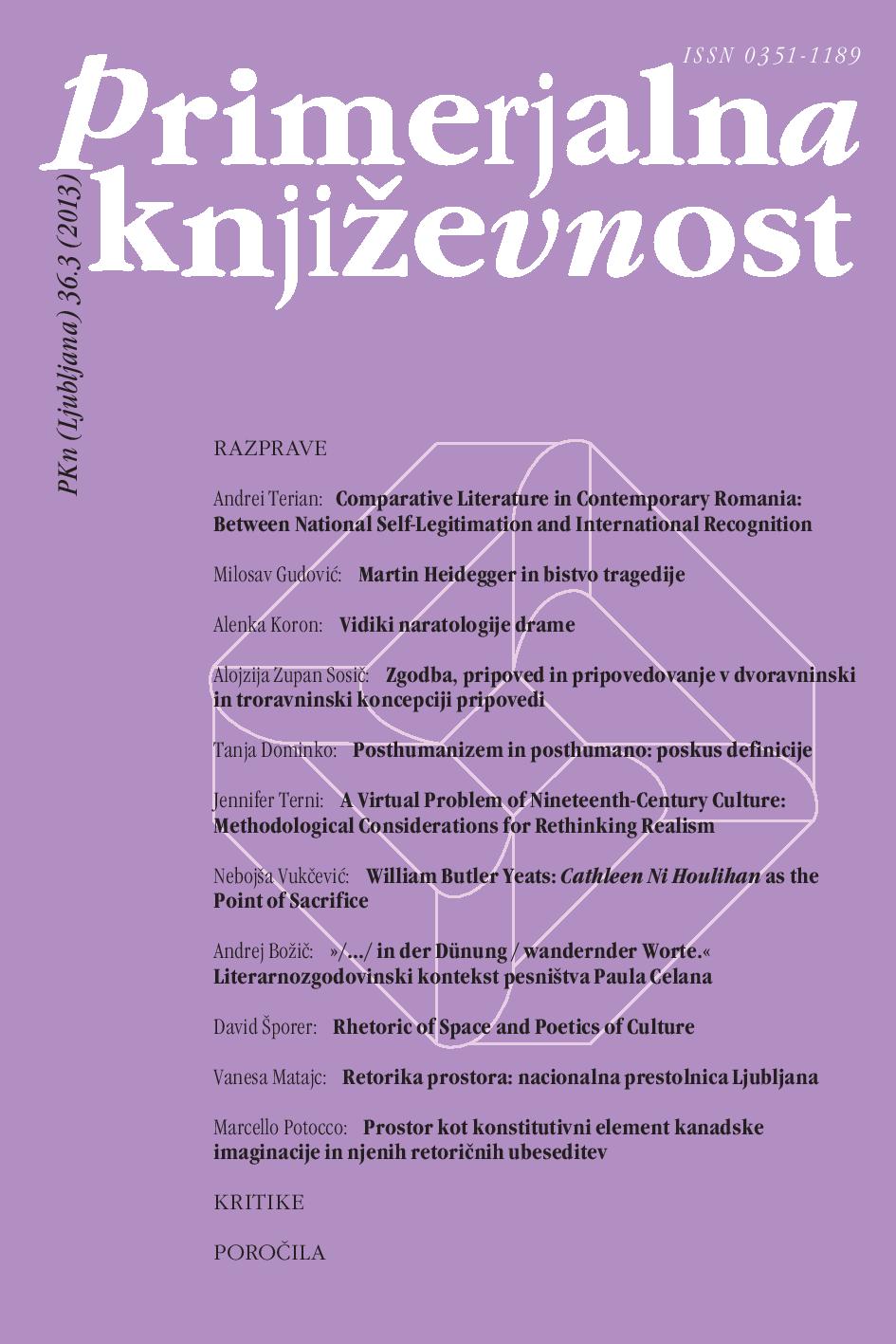Posthumanism and the Posthuman: Towards a Definition
Keywords:
ethics, posthumanism, transhumanism, the cyborg, hybridity, interdiscursivity, hypertext, technologyAbstract
We bear witness to an ever-increasing saturation of the everyday human experience with advanced technology and a gradual virtualization of the real, which, in a complex collaboration with various other factors, intensifies the post-Enlightenment crisis of Western humanism and anthropocentrism. A number of discourses in socio-symbolic circulation co-create, narrate, imagine, endow with meaning, and question the ethos of contemporary humanity, from cultural studies, philosophy, and critical theory to literature. This article identifies the possible common points of inception, interminglings, and discrepancies between the most prominent (and often quite heterogeneous) notions of the posthuman and posthumanism, and delineates them from the related concepts of the transhuman and transhumanism. Due to spatial constraints, this is done fragmentarily and with considerable abstraction. Whereas the posthuman is perceived as a thematic figuration born out of the cybernetic paradigm and subsumed under the more general concept of the transhuman, which is made available for appropriation or transformation to various -isms (such as posthumanism and transhumanism), posthumanism and transhumanism are of a different ilk. They are precisely the ideologically or philosophically defined movements that may interpret the posthuman each in their own way. Whereas transhumanism (or popular posthumanism) aims towards a techno-transcendence that should be achieved through the use of machines and mind-uploading, reduces embodiment to patterns of information, and further reinforces the liberal humanist subject who instrumentalizes all in the name of the phallogocentric “ratio”, critical posthumanism refuses to yield to such abstraction and aims to work through Western liberal humanism, stressing the importance of embodiment, finding inspiration in the philosophy of poststructuralism and deconstruction, and seeking a new posthuman ethos together with a social shift of paradigm.References
Bell, David. Cyberculture Theorists. New York: Routledge, 2007.
Bostrom, Nick. »A History of Transhumanist Thought«. Journal of Evolution and Technology 14.1 (2005). Splet. Maj 2012.
– – –. »The Transhumanist FAQ: A General Introduction«. Transhumanism.org. 2003. Splet. Avgust 2012.
Braidotti, Rosi. »Affirming the Affirmative: On Nomadic Affectivity«. Rhizomes 11/12 (2005/2006). Splet. September 2012.
– – –. Nomadic Theory: The Portable Rosi Braidotti. New York, Chichester, West Sussex: Columbia Unversity Press, 2011.
– – –. »Posthuman, All Too Human: Towards a New Process Ontology«. Theory, Culture & Society 23.7–8 (2006). 197–208. Splet. September 2012.
Dabashi, Hamid. Corpus Anarchicum: Political Protest, Suicidal Violence, and the Making of the Posthuman Body. New York: Palgrave Macmillan, 2012.
Fukuyama, Francis. Our Posthuman Future: Consequences of the Biotechnology Revolution. New York: Picador, 2002. [elektronska knjiga, 2011]
Geraci, Robert M. Apocalyptic AI. Oxford: Oxford University Press, 2010.
Goicoechea, María. »The Posthuman Ethos in Cyberpunk Science Fiction«. CLCWeb: Comparative Literature and Culture 10.4 (2008). Splet. Avgust 2011.
Graham, Elaine L. Representations of the Post/Human: Monsters, Aliens and Others in Popular Culture. New Brunswick, New Jersey: Rutgers University Press, 2002.
Haraway, Donna Jeanne. The Haraway Reader. New York, London: Routledge, 2004.
Hayles, N. Katherine. How We Became Posthuman: Virtual Bodies in Cybernetics, Literature, and Informatics. Chicago, London: The University of Chicago Press, 1999.
– – –. My Mother Was a Computer: Digital Subjects and Literary Texts. Chicago, London: The University of Chicago Press, 2005.
– – –. »Refiguring the Posthuman«. Comparative Literature Studies 41.3 (2004). 311–316.
Hitchcock, Peter. »Grotesknost telesne elektrike«. Historični seminar 3. Ljubljana: Založba ZRC, 2000. 97–115.
Hutcheon, Linda. A Poetics of Postmodernism: History, Theory, Fiction. 1988. New York, London: Routledge, 1995.
Juvan, Marko. »Dialogi med ’mišljenjem’ in« in ’pesništvom’ in teoretsko-literarni hibridi«. Primerjalna književnost 29. Posebna številka (2006): 9–26.
– – –. Literarna veda v rekonstrukciji: uvod v sodobni študij literature. Ljubljana: LUD Literatura, 2006.
Koron, Alenka. »Teorije/teorija diskurza in literarna veda: I. del«. Primerjalna književnost 27.2 (2004): 97–117.
– – –. »Teorije/teorija diskurza in literarna veda: II. del«. Primerjalna književnost 28.1 (2005): 119–134.
Livingston, Ira. Arrow of Chaos (Romanticism and Postmodernity). Minneapolis, London: University of Minnesota Press, 1997.
Kroker, Arthur in Marilouise, ur. Body Invaders: Panic Sex in America. Montreal: Theory, 2001.
Kurzweil, Ray. The Singularity Is Near: When Humans Transcend Biology. London: Penguin, 2005.
LaGrandeur, Kevin. »Do Medieval and Renaissance Androids Presage the Posthuman?« CLCWeb: Comparative Literature and Culture 12.3 (2010). Splet. Avgust 2011.
Lyotard, Jean-François. The Postmodern Condition. Manchester: Manchester University Press, 1984.
Micolli, Anthony. Posthuman Suffering and the Technological Embrace. Plymouth, VB: Lexington Books, 2010.
Pepperell, Robert. The Posthuman Condition: Consciousness Beyond the Brain. Bristol, VB: Intellect Books, 2003.
Richards, Jay W., ur. Are We Spiritual Machines? Ray Kurzweil vs. the Critics of Strong A. I. Seattle, WA: Discovery Institute, 2002.
Seltin, Jon. »Production of the Post-Human: Political Economies of Bodies and Technology«. Parrhesia 8 (2009). 43–59.
Shelley, Mary. Frankenstein. 1831. Oxford: Oxford University Press, 2008.
Sheridan, Alan. Michel Foucault – The Will to Truth. 1980. London, New York: Routledge, 2005.
Sorgner, Stefan Lorenz. »Beyond Humanism: Reflections on Trans- and Posthumanism«. Journal of Evolution and Technology 21.2 (2010). Splet. Maj 2012.
Vint, Sherryl. Bodies of Tomorrow: Technology, Subjectivity, Science Fiction. Toronto, Buffalo, London: University of Toronto Press, 2007.
Virk, Tomo. Moderne metode literarne vede in njihove filozofsko teoretske osnove. 1999. Ljubljana: Znanstvena založba Filozofske fakultete Univerze v Ljubljani, 2008.
– – –. Strah pred naivnostjo: poetika postmodernistične proze. Ljubljana: LUD Literatura, 2000.
Waugh, Patricia. Metafiction: The Theory and Practice of Self-Conscious Fiction. 1984. London, New York: Routledge, 1993.
Wolfe, Cary. What Is Posthumanism. Minneapolis, London: University of Minnesota Press, 2010.


